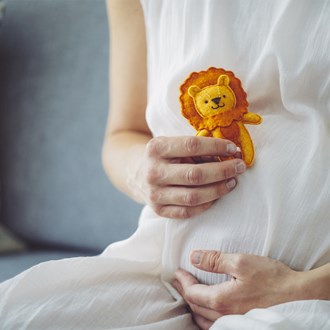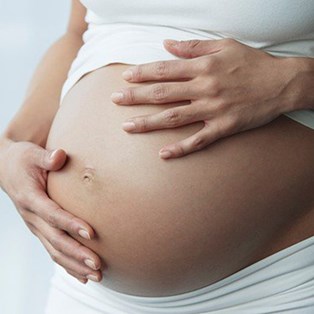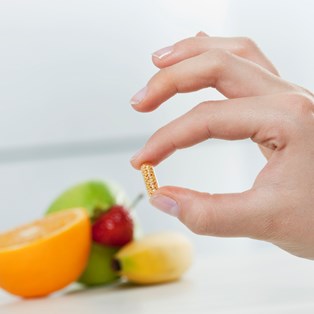Can a pregnancy test be wrong? (false positive and negative)
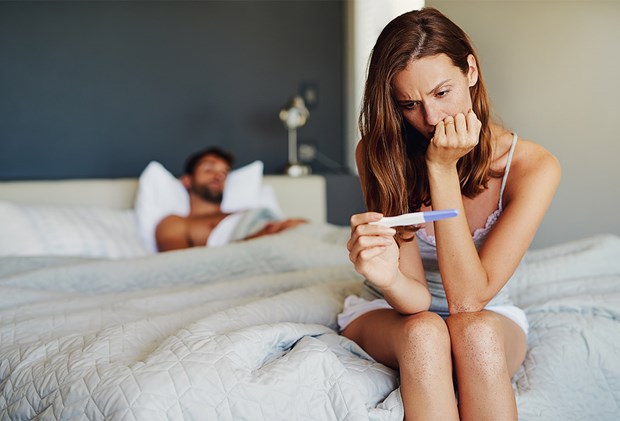
If you're taking a pregnancy test, it's good to know the facts about the results
By Frances Sheen
February 05 2019
Can a pregnancy test ever be wrong?
Whether you want to be pregnant, or you don't, it's easy to assume pregnancy tests are always right. In truth there are a range of factors which can give you a false positive or a false negative result. Here's how to know if your home pregnancy test is accurate.
A general overview of pregnancy tests
How accurate are home pregnancy tests?
Home pregnancy tests are now so technologically advanced, some claim they can tell if you're pregnant five days BEFORE you are due to get your period.
They work by detecting the pregnancy hormone hCG (human chorionic gonadotropin) in the urine of the woman. The body starts to produce hCG once an egg has been implanted into the womb and it will show up in the urine. This will probably be before you experience any pregnancy symptoms.
There are two different types of tests you can take: qualitative and quantitative.
A qualitative pregnancy test
A qualitative test picks up on units of hCG above 25 (measured in mIU per millitre). It simply determines if hCG is in your urine so it won't give you a reading of how much hCG there is.
Pregnancy tests that simply reveal two lines, a happy face or the words 'yes' or 'pregnant' are all qualitative pregnancy tests
A quantitative pregnancy test
A quantitative pregnancy test, is slightly more advanced. It will confirm you are pregnant AND can also determine how many weeks pregnant you are likely to be based on how much hCG you have in your urine (it will display either 1, 2 or 3+ weeks in the window).
You can also try a blood test to measure the exact amount of hCG in the body, and this should let you know accurately whether you're pregnant and how many weeks pregnant you are.
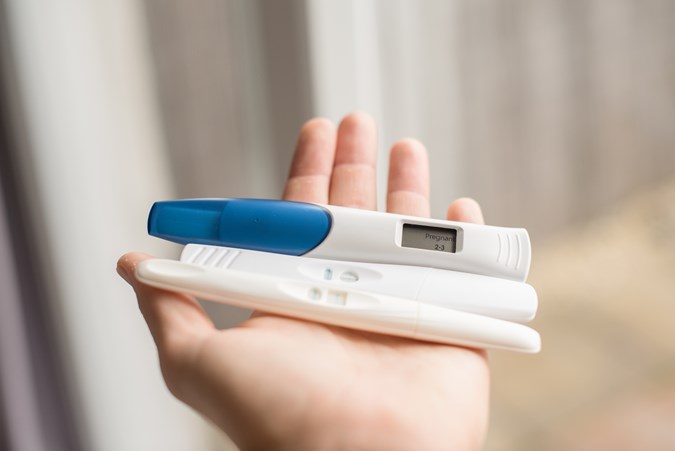
Getty
Is it possible to get a false positive pregnancy test?
Yes, you can you get a false positive pregnancy test, but it is rare.
Here are some reasons why a pregnancy test may record a false positive pregnancy result, even if you are not actually pregnant.
1. Contaminated equipment
If there's any detergent like washing up liquid or soap on the cup you collect the pee in, you may get a false positive pregnancy result. Try to wee directly onto the test by sticking the test directly in the urine stream. Alternatively make sure any equipment you use is new, washed, dried and wiped clean.
2. Defective tests
Check the use-by date on your pregnancy test before using it. Pregnancy tests may not work if the tests have been mishandled - leaving the packaging open in bathrooms means they may have been exposed to heat or moisture.
3. Other medical issues
If you are unwell, you may have blood in your urine (such as with cystitis) or a protein (like kidney disease or damage) and that can cause an incorrect reading. Also ovarian cysts and menopause can potentially cause a false positive test. There are rare cases of it occurring in phantom pregnancies.
4. Taking medication when you take the pregnancy test
The UK NHS website lists the following medications which may cause DIY tests to show a false positive test. Read the information leaflets in the medication packet or check with your pharmacist to see if drugs you are taking can affect your results.
- Allergy medication, like promethazine
- Drugs to treat Parkinson's disease
- Diazepam and other anti-anxiety medications
- Clozapine and other anti-psychotics
- Diuretics
- Epilepsy medications
- Infertility medications
If you're taking any regular medications, it might be best to check if they can affect accurate pregnancy test results.
5. Previous or non-viable pregnancy
If you recently had a baby, an abortion or a recent miscarriage, the pregnancy test may still pick up hCG for a few weeks afterwards. This can cause a false positive result.
A positive test doesn't always mean a pregnancy is viable or will progress. A miscarriage can occur so soon after implantation that it may not even delay your period, and you might not have noticed you were pregnant except for this positive test result. This is called a chemical pregnancy and it's very common.
Many women who have chemical pregnancies report they have a positive pregnancy test then a negative one.
Follow-up blood tests will be able to tell whether your hormone levels are dropping or rising.
There is also the possibility of an ectopic pregnancy, where the egg implants somewhere other than the uterus. This can be a serious medical condition and the pregnancy can not be carried to term.
6. Undiagnosed medical conditions
The presence of hCG could be down to the possibility of an ovarian tumour or a molar pregnancy, where there is no baby but a growth instead. That's why checking pregnancies out with a doctor's visit is always a good idea.
7. Not following the pregnancy test instructions properly
All brands of pregnancy tests are different and all of them have different instructions of use. For example, each brand gives guidelines on when you need to wee on the stick or dip it in the cup of urine, and how long you need to wait before reading the result.
If any of the steps are carried out incorrectly, if urine splashes on the results window, or the test isn't laid on a flat surface, the results can be affected.
Take your time to read through the instructions first. If you're worried go to the doctor and ask for a test.
8. Evaporation lines
Sometimes an 'evaporation line' can appear on a test as urine dries in the test window, and some women may confuse it for a very faint second line.
It's most likely to show up when a test is viewed a long time after the time limit in the instruction, and it can be a different colour to the line that normally appears with a positive result. Always take another test if this happens.
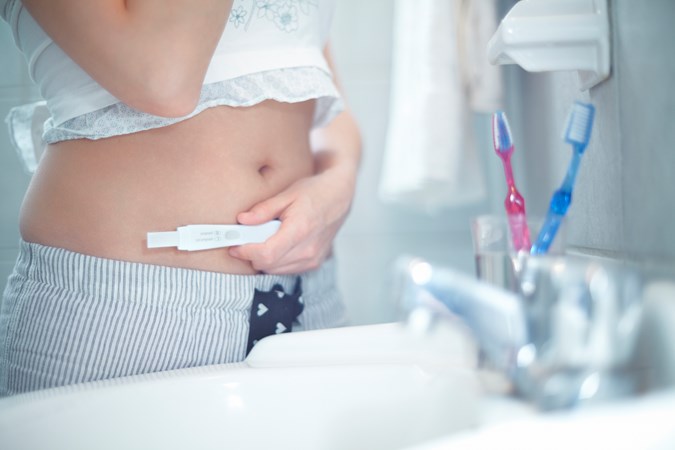
Getty
Is it possible to get a false negative pregnancy test?
Yes. It is far more likely to get a false negative pregnancy test result than a false positive pregnancy test result.
Here are the most common causes:
1. Taking your pregnancy test too early
Yes, you are desperate to find out if you're pregnant, but if you take the test too early you could get a false negative result. Always check the packet of the pregnancy test and double check the recommended time to test. The levels of hCG may not have built up enough to be detected if you test too early.
As a result, you might get a negative result but actually be pregnant, just not pregnant enough to show up. Better Health Victoria recommends waiting until your period is at least one week late, though 2 weeks past period should confirm.
2. Not waiting long enough before checking the result
The tests take a while to work. Use a timer or a watch with seconds to make sure you wait exactly the time stated in the instruction. (See above how waiting too long can give a false positive.)
3. Not following the pregnancy test instructions
Reading the information that comes with your test is important. If you don't follow the instructions to the letter, you might find that your test gives you the wrong result. Make sure you follow them closely.
4. Diluted urine
If you have been drinking a lot of water before your test, it can affect the levels of hCG in your urine. That's why it's recommended to take the test during your first wee of the morning, which is usually the most concentrated.
5. Waiting until you are too pregnant!
There is also the possibility of waiting until you are too far into the pregnancy for accurate hCG results. They are going to be too high to detect. Occasionally this can occur after five weeks.
If the home pregnancy test says you're not pregnant but you have pregnancy symptoms including nausea, tiredness, sore boobs, a metallic taste in your mouth and no period, try taking a follow up test or see your GP.
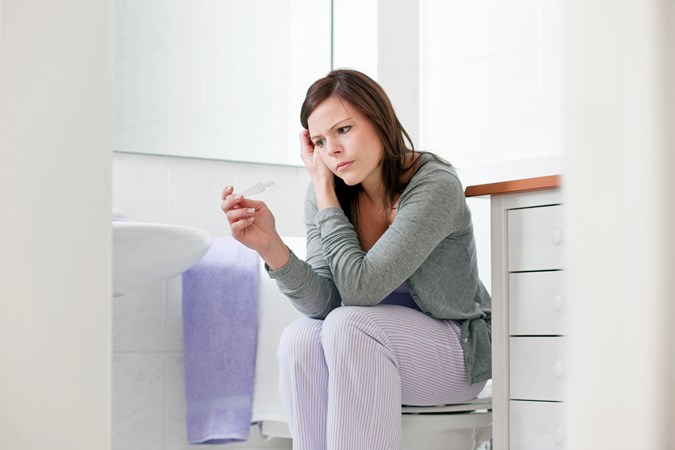
Getty
What is the best way to get a 100% accurate pregnancy test?
The best way to get accurate results from a home pregnancy test is to make sure you follow the instructions that come with your test as carefully as possible.
And for more accurate results, the best time to take a pregnancy test is to wait until at least the first day your period is due, if not a week later.
During early pregnancy, the hCG concentration increases rapidly — doubling every two to three days so waiting until you are a couple of days late with your period is ideal.
It can be hard to know when your period is due as the exact timing of your ovulation varies from month to month meaning that the fertilized egg can implant in the uterus at different times. This can affect when HCG production begins and becomes detectable.
Doctors sometimes recommend a blood test to confirm if you have had a positive then a negative result. You can have one from 11-14 days after ovulation and they are usually 99% accurate.
Or you can have an ultrasound - where you can hear the baby's heartbeat - which can confirm the pregnancy is viable from about six weeks. This is often called a dating scan.
What should you do if you've missed a period but your pregnancy test result is negative?
If you are trying to get pregnant or are even just concerned by your lack of cycle, it's a good idea to get checked out by a doctor or medical professional.
"Many factors can lead to missed menstrual periods (amenorrhea), including thyroid disorders, low body weight, problems with your ovaries, excessive exercise and stress. If you're not pregnant, your health care provider can help you get your menstrual cycle back on track," says the Mayo Clinic website.




